Why Do German Shepherds Whine? (7 Reasons Explained)
We dog parents know this all-too-well. You’re chillin’ on the couch and about to have a Netflix evening when your beloved GSD comes charging into the living room whining uncharacteristically.
Huh? German Shepherds are stoic, confident dogs, so what gives?

Don’t worry, you aren’t alone. Many dog parents always wonder what their dogs are whining about, especially working breeds like the German Shepherd.
Dogs whine for a variety of reasons, but most often it is to communicate a need or desire. They don’t have the verbal language we do and have to convey their needs and thoughts through a combination of vocalizations and body language.
In this blog post, we will go over 7 reasons why your intimidating-looking German Shepherd might sound like a big baby every once in a while.
Your German Shepherd Wants Something
The vast majority of the time that your dog whines is because it wants something from you, whether it is to go out, to play, or for attention. The first thing to do is to identify what your dog is trying to tell you.
However, don’t always give in to the dog’s whining if it is unprovoked or inappropriate, as this can rapidly teach him that if he whines, he gets what he wants.
So what does your German Shepherd want, and how do you tell?
1. To go potty
This isn’t something you should ignore! If your German Shepherd is whining to go outside, he might stare at the door and whine, or run between you and the door.
Look out for the whining after your dog wakes up from a nap or a few minutes after he finishes his meal. That’s usually when they’ll have to go poop and pee.
Pay attention to your dog’s whining if it needs to be let out, and don’t make him hold his pee for too long or you’re going to have a very messy consequence.
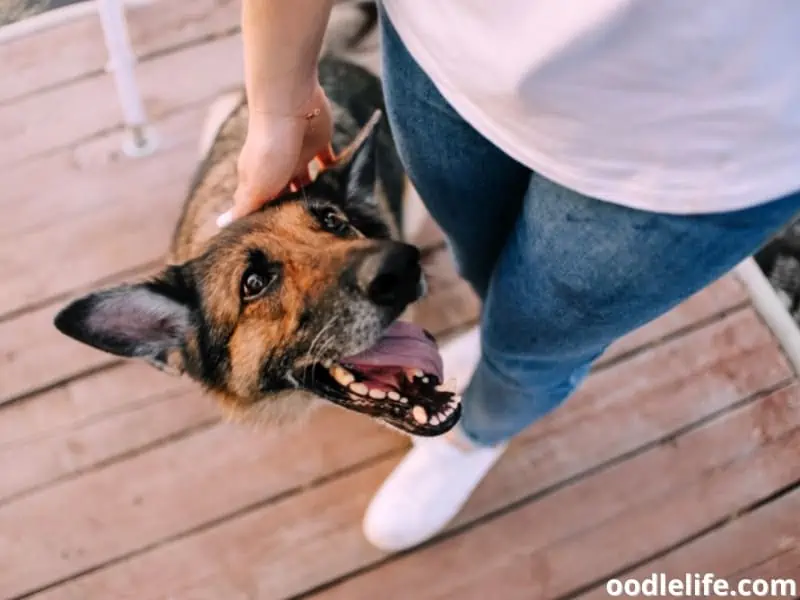
2. Your dog is bored
German Shepherds are active dogs that require a lot of activity to burn off all of their energy. These intelligent dogs, in particular, require cognitive stimulation. If you don’t give your GSD enough physical and mental stimulation, he can develop the annoying habit of whining out of boredom.
Make sure your dog is getting enough physical and mental stimulation. A good run every day or a two-hour walk might keep a German Shepherd happy.
Make sure that there are plenty of chew toys and puzzles to keep your GSD occupied when indoors, and if not, go for more walks! A hyperactive GSD is not a good idea.
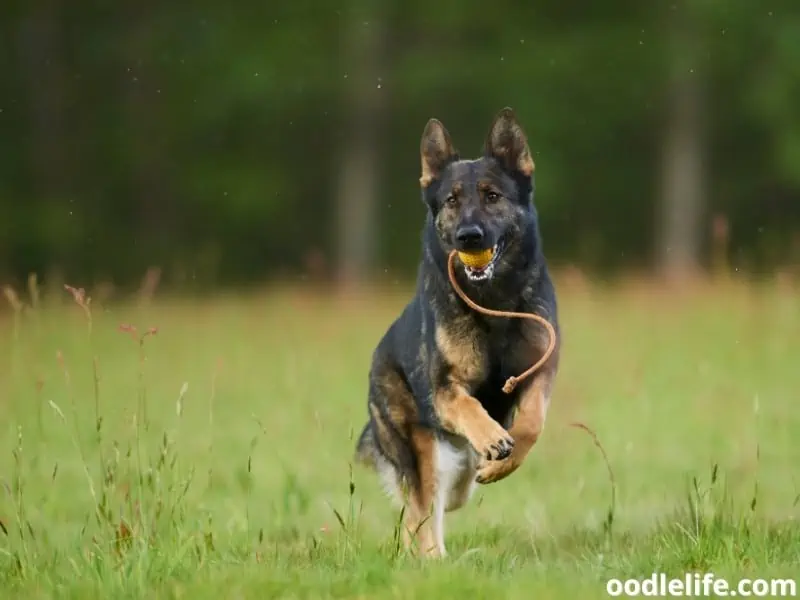
3. Your dog wants some love
German Shepherds are widely recognized for being some of the most affectionate and reliant dogs, but if you haven’t given your German Shepherd any attention in a while, it can occasionally whine for it. They are hugely bonded to their human owners and might be a little attention-seeking sook every once in a while.
If your GSD is whining for some attention, distract him first so the whining stops, THEN give the attention. Don’t give the attention immediately after he starts whining, or he’ll get it very quickly in his smart little head that whining equals attention.
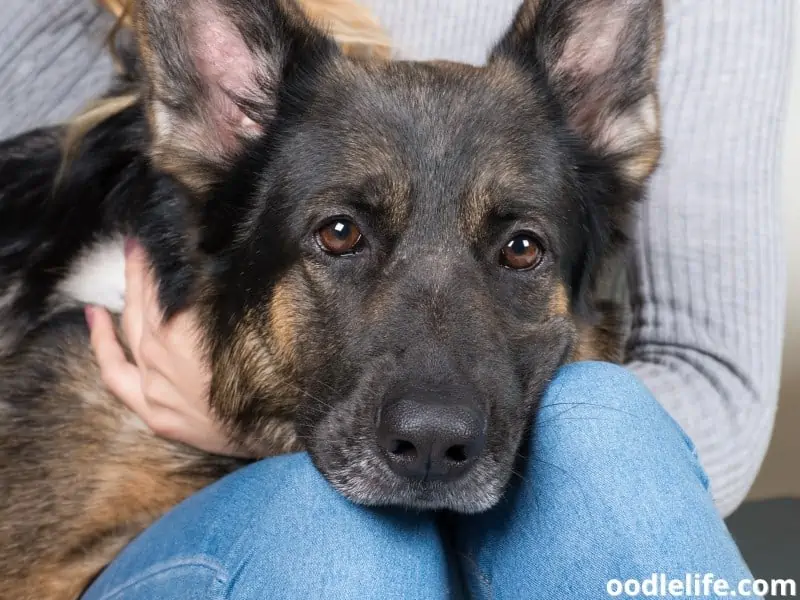
4. Your pooch is delighted to see you!
Dogs whine from extreme excitement too. When you first arrive home, your German Shepherd will most likely whine because it is overjoyed to see you.
Simply interpret this whine as a cheerful welcome, but if your GSD is prone to excessive whining and separation anxiety, you might need to wait for him to calm down before giving him the same greeting back.
You wouldn’t want to worry about instilling bad habits in your German Shepherd by allowing it to whine constantly when you arrive home.
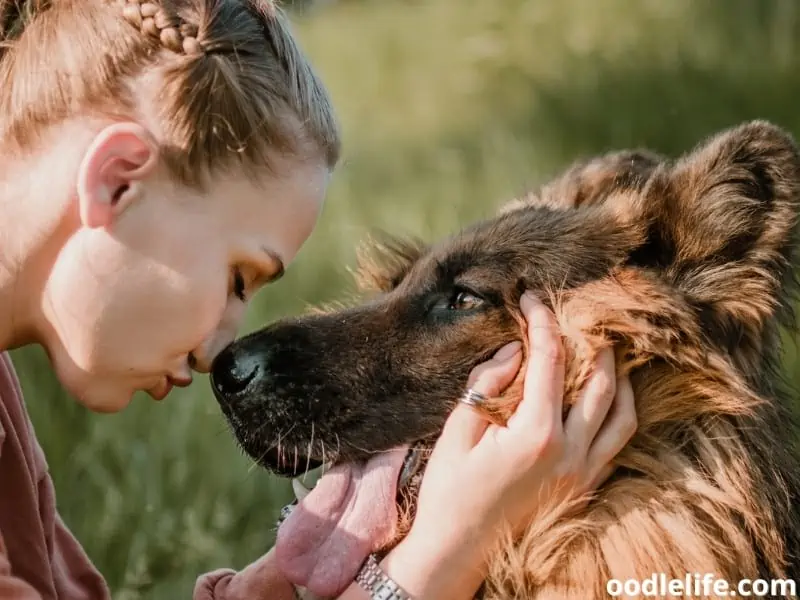
5. Your GSD is scared or anxious
Although GSDs are known to be fearless, courageous dogs, they can be scared too, just like any other dog.
Storms, stressful events, loud noises, and the unfamiliar can make a GSD anxious and scared. If your German Shepherd whines in almost the same presumably stressful conditions, it is probably scared and requires your solace.
Because you are the pack leader, when your dog is terrified, it looks to you for safety and comfort.
If your German Shepherd is whining because of a storm or another uncontrollable situation, simply soothe your dog as best you can in a calm, reassuring way. Don’t panic or seem stressed too, or your GSD is likely to pick up on it and be even more worried!

Relaxed German Shepherd lying on the floor.
6. Your dog is sick or in pain
Dogs who are in pain or sick will whine to express how they feel. Whining that is associated with other symptoms of illness, such as drowsiness, loss of appetite, and loss of interest should be checked out.
If you believe your dog is whining because it is in pain or sick, make an appointment with your vet right away. Meanwhile, comfort and be affectionate with your dog to make it feel more at ease.
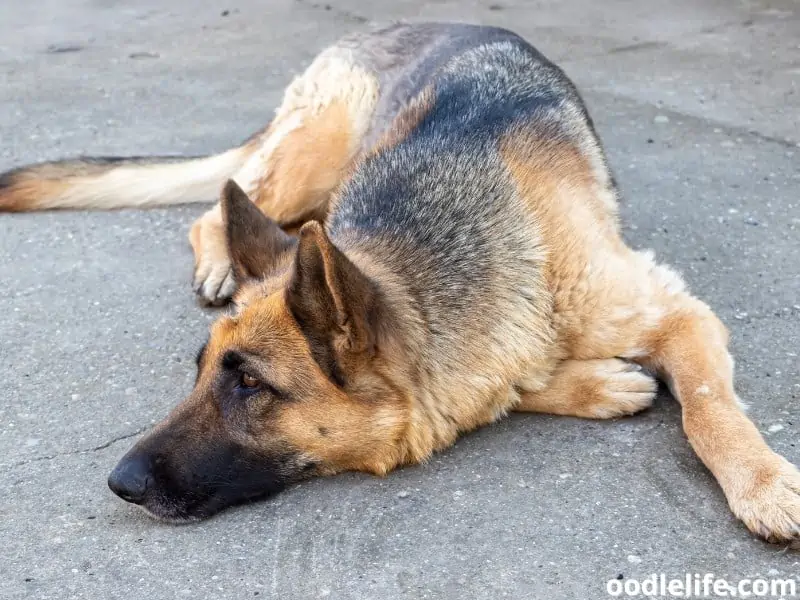
7. Your dog is apologizing
Dogs don’t really apologize, but rather, your dog can act submissive to acknowledge a mistake they made.
It isn’t that they feel guilty, but more like they sense how upset or mad you are and want to make the situation better.
Other telltale signs of a doggy apology include the tail between the legs, ears flat, and droopy body. A whine usually means it is a BIG apology!
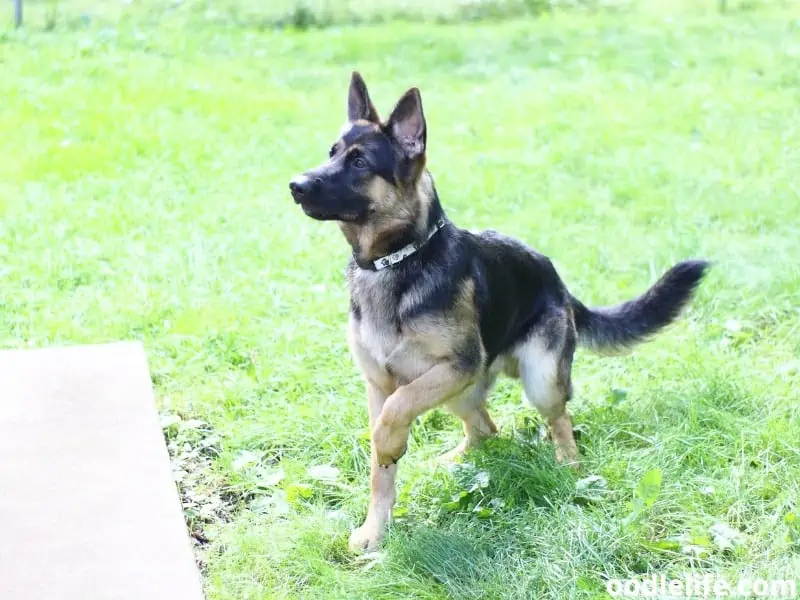
How Can You Reduce Whining?
Whining isn’t always a bad thing. For most dogs, it is simply a way of communicating what they feel or need, in the absence of the spoken language.
While some whining is normal, especially if they have a legitimate reason like wanting to be let out to go potty, excessive whining can be downright annoying.
If your GSD is whining excessively, here are some ways to deal with it.
1. Ignore it
Is he trying to get your attention out of jealousy? Simply ignore him. If you give in to such behavior, he will continue to act in this manner, which will eventually become irritating. Don’t confuse that with carelessness.
If you have more than one dog, give them equal attention; you don’t want either of them to feel neglected.
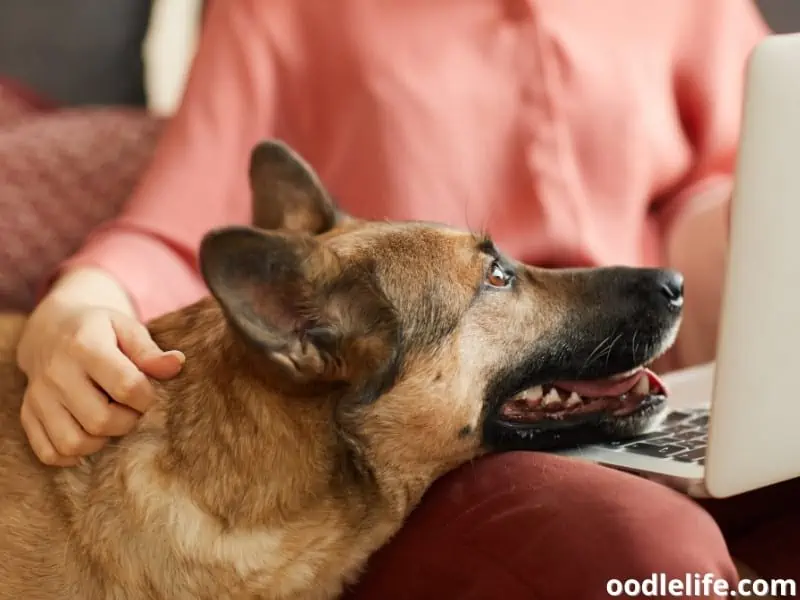
2. Go to the vet
When it comes to pain and sickness, dogs will often whine to let us know that something isn’t right. This is especially true if the pain is chronic or persistent.
If your dog has been whining more than usual, it’s important to take him to the vet to rule out any medical problems. Only a professional can properly diagnose and treat whatever is causing your dog’s discomfort.
So the next time your dog starts whining, take a moment to consider whether he might be trying to tell you something. It could be the difference between a happy, healthy pooch and one who’s in a lot of pain.
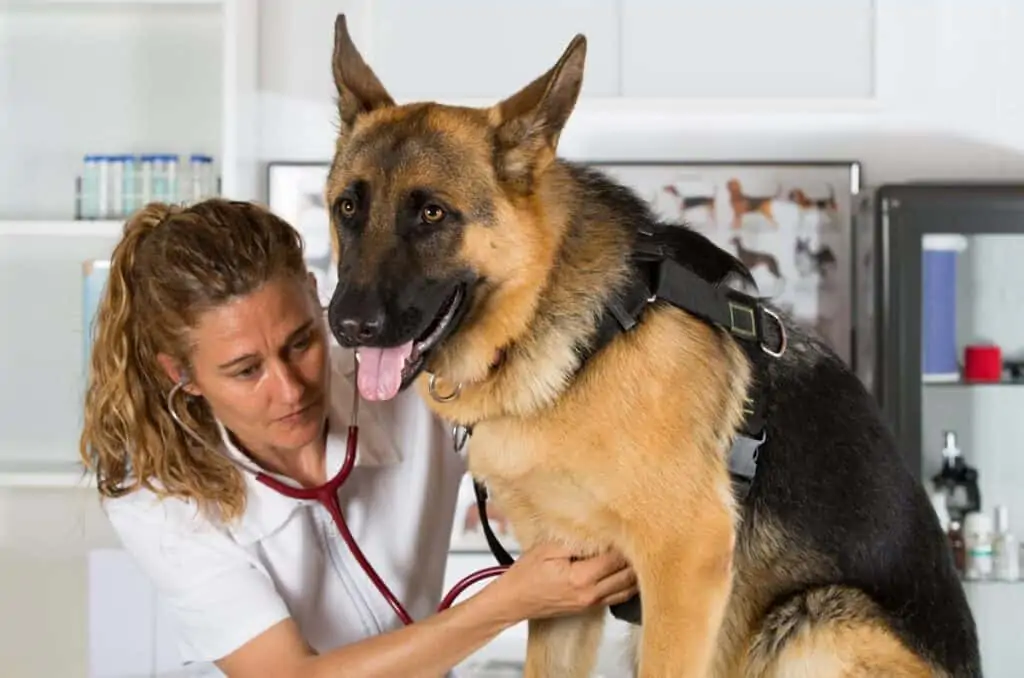
3. Training
Training will not only help your dog burn off excess energy, but it will also teach your dog to behave the way you want it to. It is best to begin as early as possible, starting with very short durations for puppies and gradually increasing the length of each training session.
German Shepherds are one of the most trainable dogs in the world, hence their popularity as working dogs. Use that working drive!
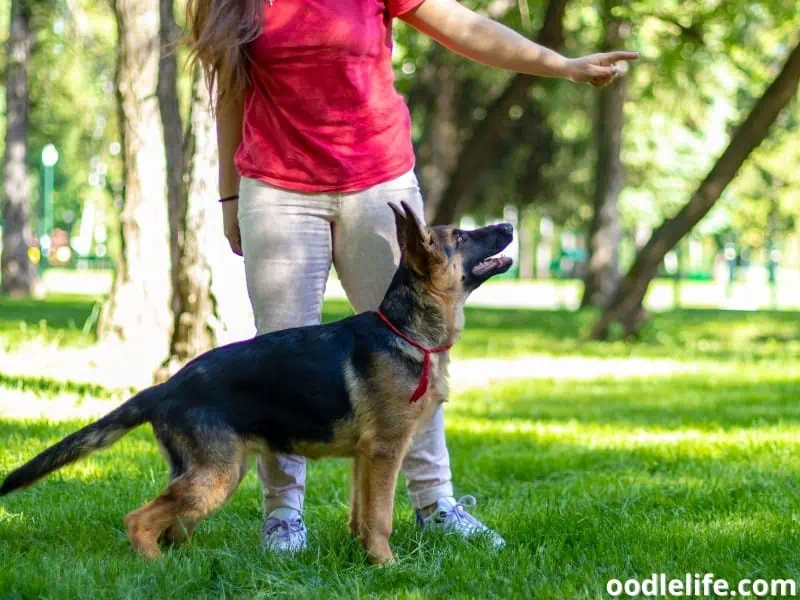
4. Distract him
When you don’t have time to shower attention on your dog, toys are a great alternative. It will keep them occupied and provide them with something to chew on. Your shoes and furniture will be forever grateful.
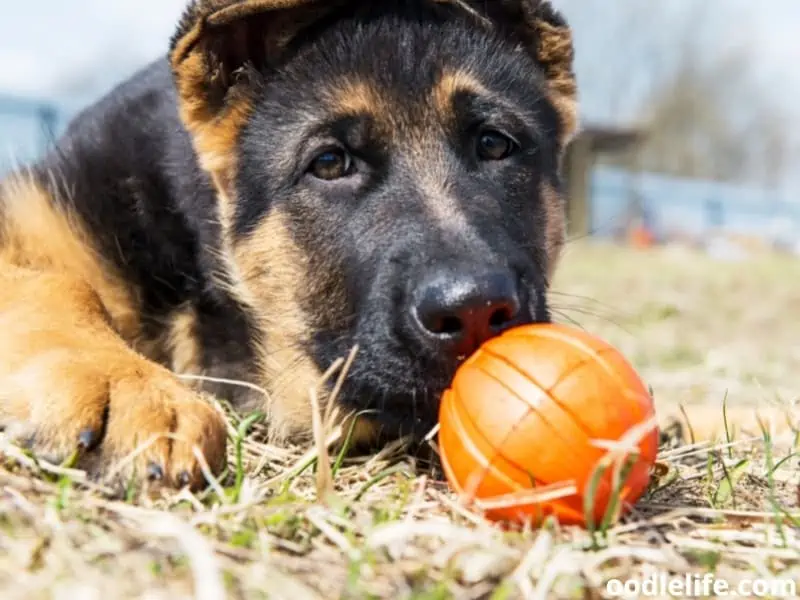
5. Give them attention
You’re busy, you have job to do, tasks to do, and you make plans for everything. But your dog has only you. He relies on you in nearly every single situation; you’d be amazed how much they miss you.
Spending quality time with your dog will not only provide them with the attention they require but will also help to reduce their anxiety and calm them down. Set aside some time in your busy day for your beloved pooch. It means a lot to them.
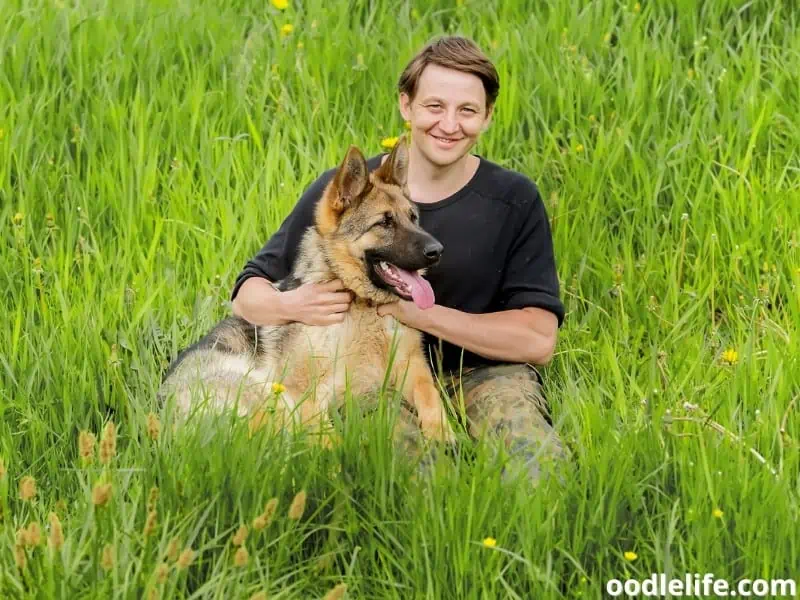
Final Thoughts
There are a number of reasons why dogs whine. Most commonly, dogs will whine when they want something – usually attention, food, or to be let outside.
If a dog is bored, anxious, or frustrated, it may also start to whine, which in most cases, is perfectly normal behavior for dogs. However, if a dog starts whining excessively, it could be a sign of a bigger problem, such as separation anxiety or another form of stress.
If you’re concerned about your dog’s whining, it’s always best to consult with a veterinarian or animal behaviorist for advice.
No matter the reason, dogs typically only whine when they feel they are not being heard. So, next time your pooch starts to whine, take a moment to listen to what he’s trying to tell you. It just might save you both a lot of frustration.